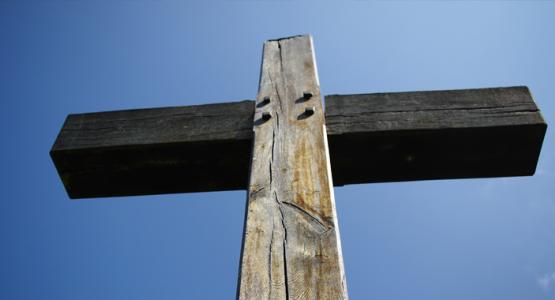
Psalm 22: The Psalm for the Cross
 Blog by Rob Vandeman
Blog by Rob Vandeman
It could have had application to a person who was going through very difficult days. But it is not a psalm written out of illness or perplexing situation, it is a description of an execution. Renowned commentator Derek Kidner writes, “No incident recorded of David can begin to account for this. . . The language of the psalm defies a naturalistic explanation; the best account is in the terms used by Peter concerning another psalm of David: ‘Being therefore a prophet, . . . he foresaw and spoke of . . . the Christ’ (Acts 2:30f.).
But it is not only that David, being a prophet, foresaw and spoke in this psalm of Jesus’ sufferings. This is also the psalm on which Jesus seems to have meditated as he hung on the cross.
What was Jesus thinking about as He was led to the place of execution? He seems, according to the record, to have been thinking about other people. When Jesus saw the women weeping after Him He said, “Do not weep for me; weep for yourselves and for your children,” and He prophesied of the terrible days to come (Luke 23:28-31). When the soldiers drove the nails through His hands and feet to affix Him to the rough wooden cross He prayed, “Father, forgive them, for they do not know what they are doing” (Luke 23:34). He had words for a dying thief: “I tell you the truth today, you will be with me in paradise (Luke 23:43). He entrusted His mother to John’s safekeeping, saying, “Dear woman, here is your son,” and to John, “Here is your mother” (John 19:26,27). In none of these sentences did Jesus seem to be thinking of Himself at all. He was thinking entirely of others.
This changed at noon. At noon a great darkness came over the land which lasted until three o’clock. The Father sent this darkness to shield Jesus during the hours He was made sin for us. These were private hours. It is as if God blotted out from view the agony of Jesus’ sufferings so that what transpired during those hours happened between himself and Jesus alone.
What was Jesus thinking during those three hours? There is no reason why we should have to know this, of course. God could have kept silent about it. But there are three important clues in the New Testament accounts.
Three Clues
First, at the beginning of this period, Jesus suddenly cried out, “Eloi, Eloi, lama sabachthani,” which means, “My God, my God, why have you forsaken me?” (Matt. 27:46; Mark 15:34). It was a direct, explicit and completely appropriate quotation from the first verse of Psalm 22.
Second, John tells us that Jesus, “knowing that all was now completed, and so that the Scripture would be fulfilled. . . said, “I am thirsty,” as a result of which the soldiers offered him wine vinegar on a sponge (John 19:28). The only Old Testament Scripture this could possibly refer to is Psalm 69:21, a psalm very similar to Psalm 22, which shows that Jesus was apparently thinking through these old Testament texts. More, over, since John says this was “so that Scripture would be fulfilled,” Jesus seems to have been deliberately reviewing these passages in his mind to be sure that he had fulfilled them completely.
Third, at the end of the period of darkness, just before he died, Jesus called out, “It is finished” (John 19:30). This is a quotation from the last verse of Psalm 22. In the psalm that verse reads, “he has done it,” referring to God as the subject. But there is no object for the verb in the Hebrew, and it can equally well be translated, “It is finished.”
Putting these clues together, we can be fairly certain that Jesus saw Psalm 22 as the psalm for the cross. The psalm begins with a description of Christ’s growing sense of alienation from the Father, as he was made sin for us. It continues with a vivid description of the crucifixion itself. It ends with triumph, as the suffering One tells how His prayer was heard and affirms that He will declare the name of God and praise God before his brethren and in the great assembly. Since Jesus ended his earthly life by quoting the last verse of this psalm, it means He did not die in despair but in triumph.
You owe it to yourself to read the New Testament account of the crucifixion as well as the related chapters in The Desire of Ages. It is difficult to comprehend what Jesus was experiencing as his Father was separating himself from His Son. But Jesus was experiencing the eternal separation from God that every person who rejects God will one day experience – what we call the ‘second death.” While He hung on the cross he could not see through the portals of the tomb. Yet he trusted his Father and gave his life to redeem us. We must always remember that though Psalm 22 starts with a cry of dereliction, it ends with a cry of triumph. Thanks be to God!
I close with one of my favorite statements from The Desire of Ages, page 25: “Christ was treated as we deserve, that we might be treated as He deserves. He was condemned for our sins, in which He had no share, that we might be justified by His righteousness, in which we had no share. He suffered the death, which was ours, that we might receive the life that was His. ‘With His stripes we are healed.’”
 Read and share these stories from the April Visitor:
Read and share these stories from the April Visitor:

Add new comment